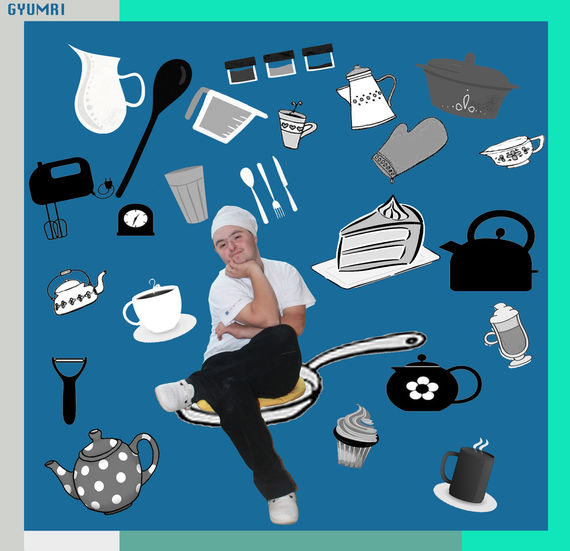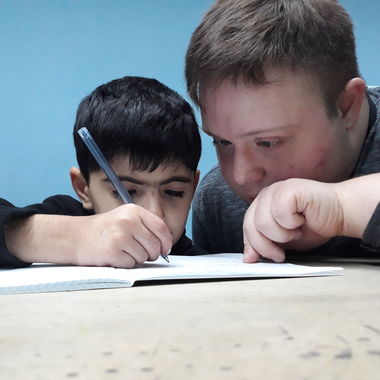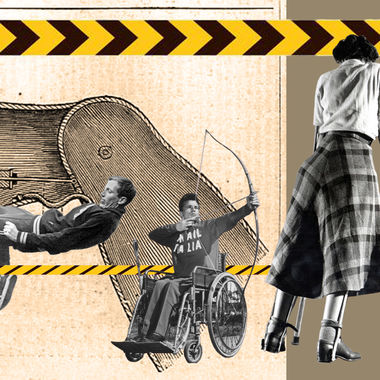Mon Dec 03 2018 · 13 min read
From Gyumri With Love: An Inclusive Cafe With a Big Heart

By Kushane Chobanyan
It was one of those rainy days typical of November when I decided to take my 4 kg of equipment and head out to Gyumri. The city, known for its rich cultural heritage greeted me with a heavy downpour. I took the first taxi to pass by and asked the driver to take me to Aregak, the first inclusive and barrier free bakery and coffee shop that has become very popular in and out of Armenia. It took about seven minutes to get from a suburb in Gyumri to the city center. The taxi driver, who was listening to one of the Beatles’ famous hits “Let it Be” started a conversation and by the time I knew it, we were in front of the café. I got out of the taxi, looked around and felt the hospitality and warmth of Gyumri. Inside the café, Grisha, the waiter made me a cup of the Aregak brand coffee. It was the best gift for someone who had just escaped the cold weather.
Aregak Bakery and Café is the initiative of Emili Aregak Development Center for Children and Young People with Disabilities, and financed by the European Union.
Our story begins in the kitchen of Aregak where the smell of Italian breads and French cakes takes over your senses and fills you up with something more important, the aroma of warmth and laughter. Michael, the young assistant of the baker asked me to wait a little bit, promising to give me an interview and an opportunity to take photos. We started our conversation as strangers and finished as though we had known each other for ages.
Michael, who has Down Syndrome, bakes breads and cakes at Aregak and even comes up with his own recipes. He has many friends at Aregak, including Grisha and Hovhannes. Michael told me that they welcome guests from all over the world and he is often giving interviews, having his picture taken and this popularity and attention is very pleasing to him. When I asked to take his picture, he began posing, like a professional and I even got a chance to have a photo with him with his now-famous thumbs up. It has become something of a brand gesture. While I was interviewing Michael, Grisha was making coffee for the visitors of the café. Some of them come to grab a cup of coffee on their way to work, others like sitting here with friends having conversations while enjoying the delicious cakes on offer.
Our conversation was taking place in the lively kitchen where balls of dough are transformed into little pieces of art and then go right into the oven. I asked the staff to give me a hair net so that I too could help Mrs. Nara make some tasty French creams. Mrs. Nara said that she would have missed out on so many important things if she was not given the chance to work with the smart young people of the café, who, according to her are unique, caring and honest young men. Our conversation lasted quite a long time and I suddenly realized that my recorder and I were disrupting the staff; I went out unnoticed leaving them in their world of infinite creativity.
Tigranuhi Hakobyan, who is the head of Aregak was already waiting for me. We spoke for quite a long time, but what is stamped in my memory is the story she told me:
“When we learned that the president of Armenia, Armen Sargsyan was going to visit our café, we discussed some rules of protocol with Michael, Grisha and Hovhannes like not kissing, not hugging, etc. When the president came Michael suddenly forgot about all the rules we had talked about. During the whole time the president was here, I kept thinking whether that meeting would have been as warm as it was if we stuck to the rules. When the president was about to leave Michael said to him, ‘You are an amazing person.’ This is what makes our café unique. People working here are open-hearted and honest.”
After spending a few hours at Aregak, I walked back out into the wet city where people were running to get away from the rain. But there are conversations that melt your heart so much that only the surprised looks of people make you understand that you are drenched from the rain and it’s probably best to keep an umbrella overhead.
I came back to Yerevan overwhelmed with Aregak. The aroma of the cakes and breads neatly packed in my bag will be a constant reminder of my encounter and will guide me back to my friends in Gyumri again and again.
Below is the English translation of the podcast:
On the way to Aregak Bakery and Café, a conversation with the taxi driver:
Kushane: You are from Gyumri, are you?
Driver: Yes, I’m from Gyumri. I will show you the way. It’s close to the square, the “Hoktember” cinema. If you are talking about the recently opened café, it’s very easy to find.
Kushane: OK, thanks a lot.
At Aregak Bakery and Café, Kushane interviews Michael, a baker who has Down Syndrome:
Kushane: Mik (diminutive for Michael) are you from Gyumri?
Michael: I live in Gyumri and I’m from Gyumri.
Kushane: How long have you been working here?
Michael: For quite a long time.
Kushane: Do you like cooking and baking?
Michael: Yes.
Kushane: Which subjects did you like most at school?
Michael: Armenian language, math.
Kushane: So, do you think you can solve a math problem now?
Michael: I think I’m not good at math.
Kushane: Which subject are you good at?
Michael: I guess physical education is what I’m good at.
Kushane: Does that mean you love sports?
Michael: Yes, I love jogging and I also do horizontal bar hanging. I can do it three times.
Kushane: Mik, you come here at 9 o’clock and go to the kitchen.
Michael: Yes, I work in the kitchen.
Kushane: Whose assistant are you?
Michael: Anahit Avdalyan’s.
Kushane: Is she strict?
Michael: Not at all. We are friends. Sometimes I give her cheek a kiss.
Kushane: Tell me please, what has she taught you?
Michael: She has taught me to make bread, cakes and pies.
Kushane: Oh, you can make a cake?
Michael: Yes, I do it on my birthday.
Kushane: Can you tell me what I would need to have to make a cake?
Michael: You need 10 eggs, cream, one cup of sugar, flour. You need to mix the eggs, then add sugar and flour.
Kushane: That’s it? Is my cake ready?
Michael: Yes, we are done with the cake.
Kushane: And what do I need to make bread?
Michael: You need flour, butter and oil. I can make coffee too.
Kushane: Great. Do you like creating your own recipes?
Michael: Yes, I make winter salad. To make it you will need tomatoes, some greens and oil.
Kushane: Michael, I know that the president of Armenia visited the café. Tell me, what did you talk to him about? Did he ask you questions?
Michael: Yes, we sat down there [pointing to his place] and journalists were filming us. We were talking about the restaurant.
Kushane: What other guests have you had here?
Michael: There is an actor, his name is Levon. Well, not name, surname, I can’t remember now. He is the grandson of the famous actor Khoren Abrahamyan.
Kushane: Let me think, maybe his name is Khoren Levonyan?
Michael: Yes, exactly.
Kushane: Did you like him?
Michael: Yes, he is a good man and very tall [laughing].
Kushane: What do you do when you are home?
Michael: I love listening to music but only Armenian.
Kushane: Who is your favorite singer?
Michael: I love listening to Arame [Armenian pop singer] but I prefer his new songs, not old ones.
Kushane: Do you have friends here?
Michael: Yes, my friends are Grisha and Hovo (diminutive for Hovhannes).
Kushane: OK, where is Hovo?
Michael: He has gone.
Kushane: Is he a baker too?
Michael: No, he is a waiter.
Kushane: Good. Mik are you happy you have a job?
Michael: Yes, I am.
Kushane: What do you do with your salary?
Michael: I give it to my parents.
Kushane: Do you have siblings?
Michael: No, I don’t have siblings. I’m an only child.
Kushane: Would you love to make bread your whole life?
Michael: I want to become a chef and have my own restaurant.
Kushane; Mik, do you love when people come and ask to see you, talk to you and thank you for the tasty breads you make?
Michael: Yes, I love that.
Listen to the podcast (in Armenian)
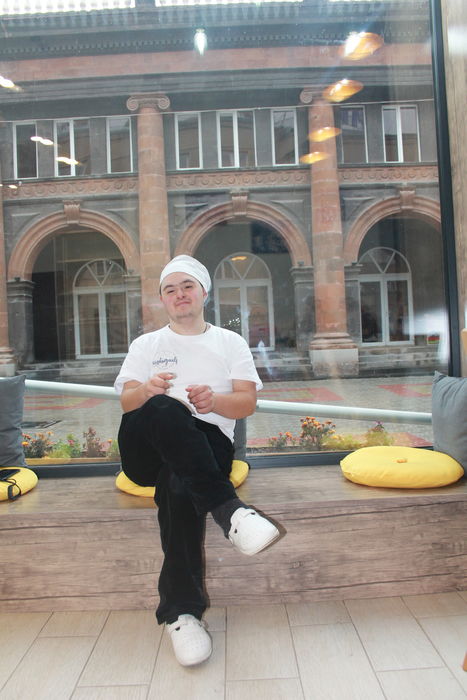
Michael at Aregak Bakery.
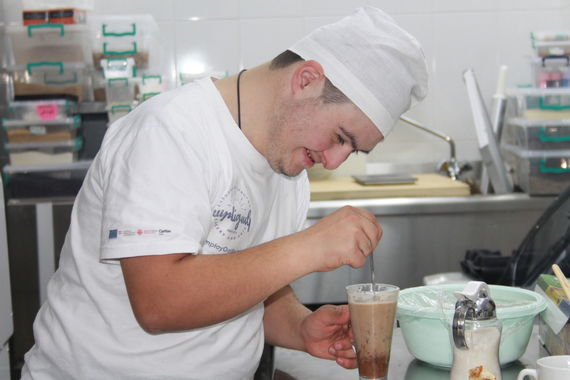
Michael at work.
also read
Tigran Gevorgyan: Breaking Stereotypes One Stroke at a Time
By Kushane Chobanyan
Being born with Down Syndrome has not stopped Tigran Gevorgyan from pursuing his dreams. From winning gold medals at the Special Olympics to finding love, Tigran is not only breaking stereotypes, he’s creating a life of joy, fulfillment and meaning.
A Hidden Minority: Children With Disabilities in Armenia
By Kristen Anais Bayrakdarian
“There are no invalids in the USSR!” This much heard expression exemplifies how people with disabilities were stigmatized in the Soviet Union. How pervasive is the exclusion of people with disabilities in post-Soviet Armenia? Anais Bayrakdarian talks to experts working in the field and writes that the true measure of any society can be found in how it treats its most vulnerable.
An interview with Anush, waitress at Aregak Bakery and Café.
Kushane: Anush what do you do here?
Anush: I was a volunteer at the Emili Aregak Center, but now I’m the barman’s assistant and waitress at the café. People visiting this café are very kind. They know that Aregak is an inclusive café. Every person entering this café is tolerant towards the service. Even when there are mistakes, we try to solve every problem by smiling and helping each other. For example, two days ago we had very important guests. I took the coffee cups and suddenly poured the coffee on one of the guests. I have some issues regarding my hands that’s why it’s sometimes very difficult to control. But I work hard to avoid problems and as we are family here, everyone helps each other. Besides, this café is so popular due to its inclusivity, that everyone knows where they are coming.
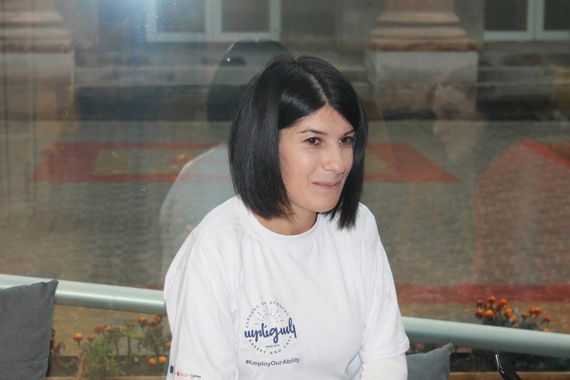
Anush at the Aregak Bakery.
Visitors enter Aregak:
Visitor 1: Hello guys. We wish to have some tasty coffee, cakes. What would you suggest?
Worker: My personal opinion is that pear with cinnamon is the best option to try.
Visitor 1: OK, let’s do it this way. We want everything, just cut them into two pieces so that everyone may try them.
Kushane: Do you come here often?
Visitor 2: Unfortunately, this is the first time I’m here with my friends just to have a coffee. Every day I come here to buy bread because it’s unique and tasty.
Visitor 2: Oh yes, I think we will take bread with us to Yerevan.
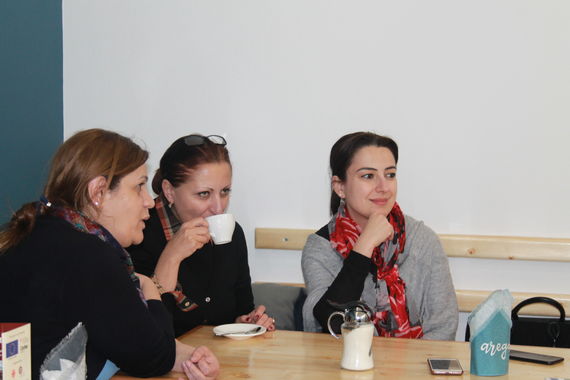
Visitors at the cafe.
Photos by Hasmik Topalyan
Visitor 1: You know what I’ve noticed? People visiting this place are different. They are very interesting, I love following them.
Kushane: Have you decided what to try today?
Visitor 1: Yes, yes, they suggested to us what we should eat. But I also tried the croissant with chocolate, it’s delicious.
Visitor 2: I think this café is more popular in Yerevan. People ask everyone if they have visited Aregak while being in Gyumri.
Interview with employee, Nara, a mother of a child with a disability:
Kushane: What are you doing now.
Nara: I am making French cream brioche. It has two versions; one is classical, we have it there, you can see. And the second is with cream and fruits. The cream is a very simple one, the French pronunciation makes it unique [smiling]. I was invited to work in this café because they wanted to bring together moms of children with disabilities. I’m really thankful for this job.
Kushane: Do you love it?
Nara: I love it very much. Because the kitchen is the place where you can show your creativity. Especially when a person can’t draw, sing or whatever, he can take all the potential to the kitchen and create everything.
Kushane: Is it important to give people with disabilities an opportunity to work here?
Nara: It’s extremely important. I can’t imagine this café without these amazing boys. I learn so many things from them. They help us to see life from a different angle, maybe I exaggerate something, but no, they really help us to see things differently. I don’t imagine myself without them. These guys fill this place with joy and fun. Trust me, I don’t remember myself being so happy and having so much fun.
Kushane: I’m sure fun stories happen in this bakery. Will you recall some?
Nara: Oh, there are so many. For example, Hovhannes always comes and seriously encourages me to work hard. His facial expression and the way he talks to me is already very funny. One funny situation happened with Michael. Journalists came to our café to shoot a video. I was doing my job, Michael was busy making bread. I said to him, ‘Look, they have come to shoot us.” He pushed me out of the way to show that the only person they were going to shoot was him, not me [laughing].
Kushane: Oh yes, Michael is very popular.
Nara: I want to emphasize that it is not difficult for me to work with them. They care to keep the place clean. If you ask them to do something, they do it very carefully and perfectly.
Kushane: Have you become friends?
Nara: Of course. How can I work here without them? They are very helpful. I remember a situation with Grisha. Our Grisha has some problems regarding speech and it’s sometimes difficult to understand him. One day when our baker was absent, we had to make bread that is very specific. You must cut the dough into very tiny parts but in a way that they look the same. I was trying to cut these parts with a usual kitchen knife. Suddenly Grisha came and showed me I’m doing something wrong. I said to him, ‘Don’t you see I’m in a hurry? What are you saying?’ He realized that I didn’t understand what he meant and went and brought me the round knife that would make the cutting process easy. I said.‘Grisha, how amazing you are.’ I always say that I would have lost so much if this place was not established.
Interview with Tigranuhi Hakobyan, head of Aregak Bakery and Café:
Tigranuhi: My name is Tigranuhi Hakobyan. I’m the head of Emili Aregak Development Center of Children with Disabilities, as well as the head of the Aregak Bakery and Café. Let me start with the center where children and young people with disabilities receive social service support. Starting from 2008, we were working with children with disabilities ages 5 to 15, but in 2015 when we moved to the place where the center is situated now, we started to work with children starting from 2 years old. I want to mention that the center is a really good one due to the building itself, the service we provide, the accessibility. We are sure that our work is for integration and inclusion development. This much about center. The problem for us was that our children were growing, turning 18 years old and then they didn’t know where to go and what to do. So, in 2016, the European Union announced a call about a grant opportunity for community development through social entrepreneurship, we decided to apply.
Our team suggested many interesting ideas, we had a very lively brainstorming session with a Caritas Austria representative. We knew that this grant would help us promote integration into society for people with disabilities and help them find work. Because when people who come to our center turn 18, we don’t know how to help them. Our team suggested very different ideas starting from DIY projects to gardening, because we have very big garden around Emili Aregak. You see, before getting higher education there is a big gap after school and this is a problem not only for people with disabilities. Education is very important but taking some courses from masters to specialize in any profession like woodworking, making candles, etc., can help to solve various issues we have. So, this was one of the components we discussed. The other component was to create a space for cooperation to help and guide them to vocational colleges to learn any kind of profession like cooking, wood making, carpet making, drawing, etc. One of the members of our team suggested to open a cafe in the center of the city so that everyone would have a chance to see the DIY projects we make. Someone else said that our children learn cooking and we can make everything in this café in a clean space and provide not only tasty products but very high quality ones. We understood that the assortment of breads we wish to have can’t be found in the city and decided to make different kinds of breads. After the brainstorming we applied for the grant and they gave us a month to prepare the project. Many people say that we have got very big grant for this small café but I want to highlight that the café is only one of the components of our project. The components are café and bakery, public awareness, DIY projects, gardening and cooperation. Now we cooperate with colleges, individual masters working at home, Gyumri’s employment center that provides us contacts of people with disabilities living in the region. We established the Labor Market Club where people come and discuss various problems, we teach them how to write motivation letters, CVs, etc. We host trainers including masters, journalists, human rights defenders.
Michael’s story is very interesting within the framework of our initiative; thus, I would love to share it with you. We helped Michael enter college and he has become a cook. There was a period when he needed to move from theory to practice and that’s when we came up against a wall. Michael and his mother went to restaurants, had interviews but no one wanted to hire him and after they came back to Emili Aregak. We were happy that finally Michael could use his knowledge and become a cook, but what a surprise when we found out that he wasn’t accepted. And this story made us think about Michael and the people who face this problem every day. You will see not only people with disabilities working in our café, but also mothers of people with disabilities. We trained seven mothers during the summer and four of them now have a job at the bakery. Also, here are young people who were the volunteers of our center.
Kushane: How do people living in Gyumri accept the news about the first inclusive bakery and café?
Tigranuhi: I was pleasantly surprised at their reaction, because this step was very risky. Many people told me that the word “inclusive” is enough for people living in Gyumri not to open the door to the café. But people do come here and not only because of the quality of the products, the environment, they come here and buy something simply because they wish to help people with disabilities. This grant enabled us to renovate the place where the café is situated now, to get very modern and user-friendly equipment. We took into account every single detail from accessibility to not breaking the historical-cultural view of the city. I have worked with people with disabilities for a long time and this café was established to break stereotypes, to change attitudes.
Kushane: And what about funny stories?
Tigranuhi: Oh my God, how many do you wish to hear [laughing]. OK, let me tell you the story about when the president of Armenia visited us. Before he came, we had a long conversation with Michael, Grisha and Hovhannes explaining to them that we are going to have guests which means we must follow some protocol like not kissing, being serious, etc. We also informed them that this time they are going to work as waiters. Michael and Hovhannes sometimes like competing together. So, the president came, Michael suddenly forgot about everything, sat down with him and asked Hovhannes and Grisha to bring coffee for them. Then he had a photo session with the president and broke all the rules we had agreed on. In the end when the president was about to leave, Michael said to him,’You are an amazing person.’ This phrase is enough to understand that these people are very kind, they say everything they think, they don’t hide their emotions and these emotions are very honest.

